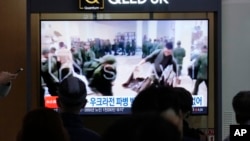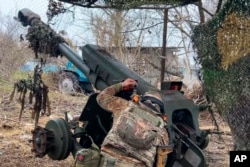North Korean troops that joined Moscow's forces about four months ago in Russia's border region of Kursk are estimated to have suffered considerable casualties in the war against Ukraine, which analysts attribute to their lack of front-line combat experience.
Numbers from different sources vary, but more than 3,000 North Korean soldiers are believed to have died or been injured while fighting Ukrainian forces.
The South Korean National Intelligence Service cited the figure in mid-January, breaking it down to at least 300 killed and another 2,700 wounded.
In an interview published Monday by South Korea's Chosun Daily, Kyrylo Budanov, head of Ukraine's military intelligence, said North Korean troops had suffered about 4,000 casualties.
That would be one-third of the 12,000 North Korean soldiers who the U.S. in December estimated had been deployed to the Kursk region.
A peace deal is being pushed by the Trump administration to end the war, which began with Russia's full-scale invasion of Ukraine on Feb. 24, 2022.
Frontal assaults
"The North Korean military personnel fighting in the Kursk region are being used for frontal assaults without much military support such as artillery and armor and drones, against some of the very best Ukrainian forces," said Bruce Bennett, senior defense researcher at the Rand Corporation.
"Many of the North Korean forces used by the Russians were trained to be special forces intended to penetrate into the enemy rear and operate there," he said. "Their North Korean training was not for frontal assaults, and they appear to not have been trained in Russia very well for such tactics, especially given the evolution of warfare to involve drones and other factors."
If the Russians are using North Korean special operations forces as light infantry units, then "they are wasting their soldiers' lives" because they are not using the soldiers' special operations training, said David Maxwell, vice president of the Center for Asia Pacific Strategy.
If the Ukrainian forces are "employing effective combined arms maneuver with integrated fire support, they will inflict tremendous damage against frontal assaults," he said.
Another reason for high casualties among North Korean troops could be "communications problems if they are working under the command of Russian forces," Maxwell said. "The language challenge hinders interoperability and the ability of the Russians to provide support" to the North Koreans.
Many of the North Korean troops deployed to Russia are reportedly from the regime's elite special forces unit known as the 11th Corps of the Korean People's Army, also known as the Storm Corps.
Headquartered in Tokchon, North Korea, the Storm Corps is trained to infiltrate and sabotage enemy operations and assassinate targets.
North Korea began sending troops to Russia in October. Former U.S. Defense Secretary Lloyd Austin said at the time that if the forces entered the war, it would be "a very, very serious issue" affecting not only Europe but also the Indo-Pacific region.
The deployment of North Korean troops, in addition to the munitions the country had been sending to Russia since October 2023, represented an escalation of military ties between Pyongyang and Moscow and a dangerous expansion of Russia's war, NATO Secretary-General Mark Rutte said in October.
The same month, South Korean Defense Minister Kim Yong-hyun described North Korean troops as "mere cannon fodder mercenaries" for Russia's "illegal war of aggression."
Russia has been using so-called meat-grinder tactics to fight Ukraine. The strategy involves mobilizing a large number of troops in a concentrated area of combat to bombard the enemy and break through its defenses. The attackers often suffer a high number of casualties.
Escalation of conflict
Ukrainian forces first reported encountering North Korean units on Nov. 5 in the Kursk region. Shortly afterward, Russia, reportedly using meat-grinder tactics, suffered a record number of casualties for the month.
Russia suffered more than 2,000 casualties on Nov. 28 alone, which helped raise the average daily Russian casualties for the month to a new high of 1,523, according to the Institute for the Study of War, citing an analysis from the United Kingdom Ministry of Defense.
Adding to the casualties are the lethal World War I-style combat tactics, such as heavy artillery bombardments and trench warfare, that have made a comeback in the Russian-Ukrainian conflict.
Russians and North Koreans "are fighting in this horrible, almost World War I-style combat, where all sides, including the Ukrainians, are taking huge casualties" with "tons of artillery" and "missiles and rockets and tanks," said Bruce Bechtol, a professor focusing on East Asia and international security at Angelo State University in Texas.
Since the start of the war, Russia is estimated to have incurred more than 860,000 casualties, the General Staff of Ukraine's Armed Forces reported Friday. Ukraine's President Volodymyr Zelenskyy said earlier this week that more than 46,000 Ukrainian soldiers had been killed and about 380,000 had been injured over that same period.
Bechtol, a former intelligence officer for the Defense Intelligence Agency, said North Korean and Russian casualties could have been "exaggerated," and it might not be possible to assess exact figures, even after the war ends.
In October, neither Moscow nor Pyongyang denied the possibility of North Korean troop deployment to Russia, nor did either fully acknowledge that North Korean soldiers were fighting Ukrainian forces.
Jeff Seldin contributed to this report.





